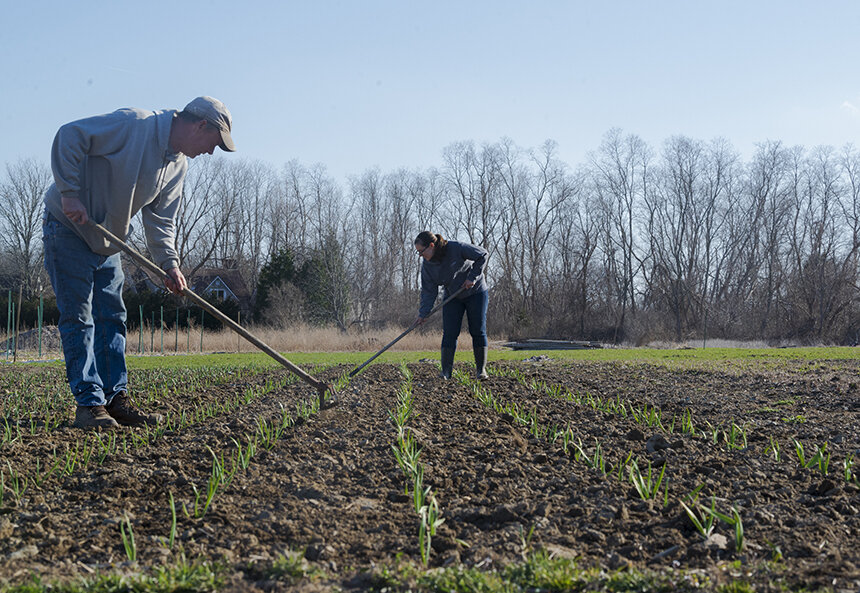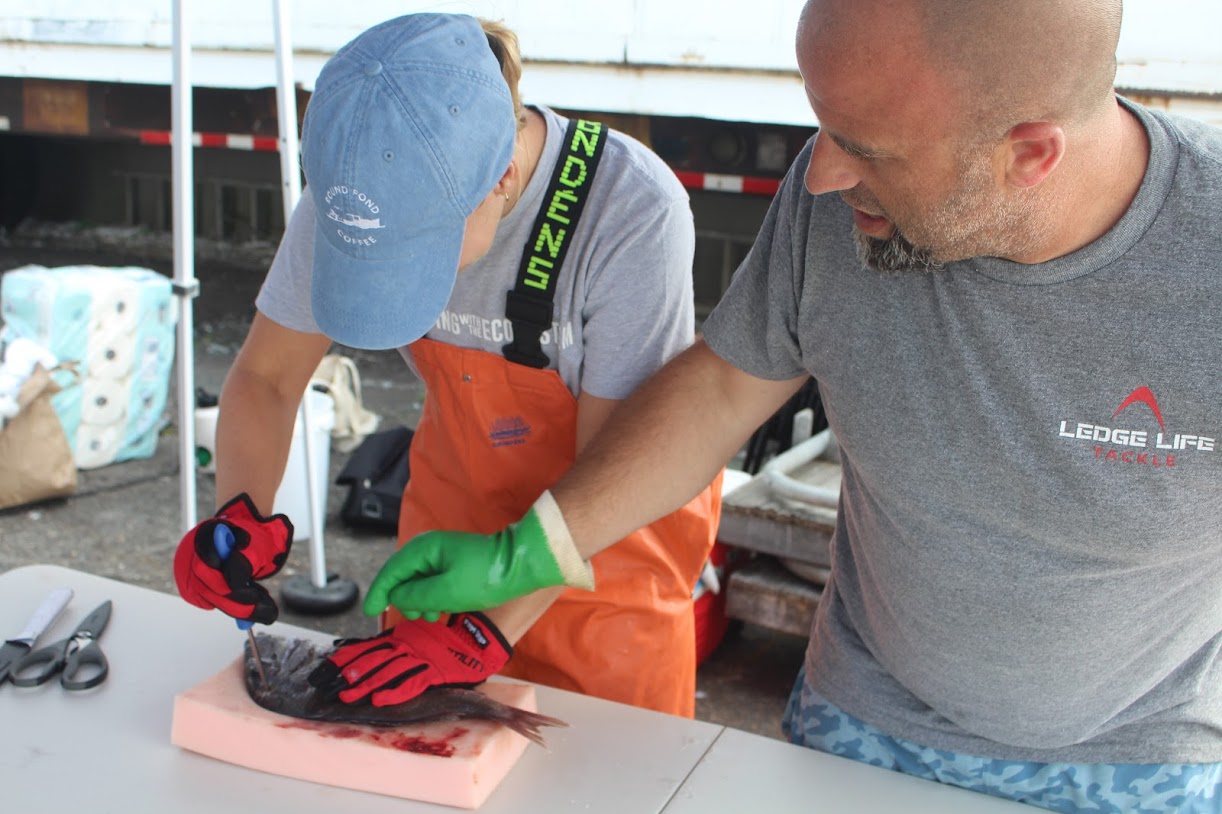Organic Corn Can Be Hard to Find
The labor-intensive crop doesn't make farmers much money
August 7, 2014
It’s corn season, so why is there so little organic corn at farmers markets and grocery stores? Most farmers will say growing organic corn is too time-consuming and largely unprofitable.
“I don’t think I make any money off of it,” said Dave Purpura of Plato’s Harvest, a 3-acre organic farm in Middleboro, Mass.
Purpura, like most organic farmers, grows small batches of corn — just a half acre — and sells it at farmers markets and through a pre-paid community-supported agriculture (CSA) program.
Bigger farms, however, don’t bother with organic corn. They see organic corn as a labor-intensive crop that pushes prices beyond the modest markup organic food receives when sold in grocery stores, according to Richard Bonanno, president of the Massachusetts Farm Bureau.
“Unfortunately, organic corn doesn’t work for wholesale,” he said.
Another issue with organic corn is worms. Conventional farming methods have eliminated the small earworm and other worms once common to corn. Now, consumers expect flawless corn.
“People won’t accept wormy corn,” said Paul Costa, 68, a lifelong farmer in Westport.
Like most conventional corn farmers, Costa follows an integrated pest-management program that relies on a minimal use of sprayed pesticides to kill worms and other threats such as leaf blight. It’s cheaper, less work and ultimately increases corn yield, he said. “You spray as little as possible.”
Bonanno estimated that a third of Massachusetts farmers of sweet corn use genetically modified corn called “Bt corn.” This GMO corn reduces the need for spraying pesticides because of an insect-killing protein produced in the kernels.
Bonanno’s estimate of Bt corn use conflicts with a report by the Environmental Working Group (EWG) that says nearly all corn on the cob, or sweet corn, is virtually GMO-free.
Purpura agreed with Bonanno, asserting that most conventional corn farmers in the region use GMO corn. “As far as I know, all the stuff in farmers markets and grocery stores is all GMO corn,” he said.
The EWG didn’t respond to a request for comment.
The EWG report noted that GMO corn and pesticide use come with risks, such as harm to bees and other insects beneficial to plants, soil quality and aquatic ecosystems. High levels of pesticides, such as the commonly used glyphosate, have been linked to birth defects and developmental disorders in humans. However, according to the U.S. Department of Agriculture (USDA), sweet corn sprayed with pesticides has only trace amounts of residue.
Still, Bt corn contains a toxin that kills insects.
“God knows what’s in it,” Purpura.
GMO corn also has been linked to pesticide tolerant “super weeds.” Scientists haven’t thoroughly explored the implications of genetically modified corn on human health or the environment, particularly over the long term, according to the EWG report.
Sweet corn, the corn eaten on the cob and processed into frozen foods, accounts for less than 1 percent of corn grown in the United States. According to the USDA, 40 percent of U.S. corn is converted to ethanol, 37 percent becomes livestock feed, and 11 percent is made into corn syrup, corn powders and cooking oil. Much of the rest is exported.
Michael Sullivan, professor of plant sciences at the University of Rhode Island says there are a variety of ways to grow corn organically and all of them require significant work. This includes walking the fields to remove harmful insects; hoeing and weeding; inter-planting other crops between rows of corn; and setting pheromone traps to capture moths. All can be done easily with a family garden, but can be cost prohibitive for a commercial farmer.
“If you are selling corn for 50 cents an ear and it costs 55 cents to grow then it may not be worth it,” Sullivan said.
For some farmers, that small amount consumed during the summer is worth growing with traditional methods. Purpura uses no pesticides and rotates his crops to improve the soil. Growing organic corn is about meeting a demand for wholesome food and building relationships within a community, he said.
“Part of it is about building trust with my customers and educating them about what it takes to grow it,” Purpura said.
He also gives his customers one reminder about his corn. “I tell people there is going to be a worm in it. They know what to expect.”




Hats off to Dave Purpura and Plato’s harvest. I live in Westport, MA where bee colony collapse is a severe problem due in large part to some corn farmers illegally spraying mixes of very toxic pesticides and spraying them at the worst time of the day from a bee’s perspective. Although the State is aware of this problem, it continues to look the other way. For this reason, I am no longer buying corn on the cob for my family unless I can get organic corn. As far as people not accepting wormy corn, why is their such a push by conventional farmers against GMO labeling. I say the consumer should have a truly informed choice. They could pick from a bin that states "organic corn but expect worms" or a bin that states that "this is worm-free GMO corn sprayed with pesticides." Which bin would you pick from.
I think someone has misled you somewhere along the line. You have assumed that the colony collapse has been caused by non organic farmers when it could just as easily have been caused by organic farmers.
Organic farmers are allowed to use pesticides which are ‘natural’, for example Rotenone and Azadirachtin – both of these can be used by organic farmers without them affecting their ‘organic’ status and both of these kill bees – I wont bore you with links, if you are interested in the subject then Google will.
As for why food should not be labelled as containing GMO’s that is because it wouldn’t actually help inform anyone and could encourage people to make bad decisions. GMO’s have been proven safe, they go through more tests than any other crops. However if an uninformed end user sees a label which says "contains GMOs" they will wonder why it has been labelled and assume it’s because there is something wrong with it, when all the scientific evidence says there isn’t.
"High levels of pesticides, such as the commonly used glyphosate, have been linked to birth defects and developmental disorders in humans."
There is no legitimate research that connects glyphosate with either of these things.
>Still, Bt corn contains a toxin that kills insects.
“God knows what’s in it,” Purpura.<
The same thing is in it as the Bt spores you spray on your organic corn.
Thank you for the article. For those saying that GMO products are tested and ‘approved safe". The idea that there should be no labeling because consumers are too ignorant to make a good decision for themselves is rubbish. The gov regulations on GMO’s are largely created by and monitored by people with direct ties the the companies that produce them. It’s like the fox watching the hen house. If they are so sure that they are right then give people the right to make good or ‘bad decisions for themselves as most of the rest of the western world does.